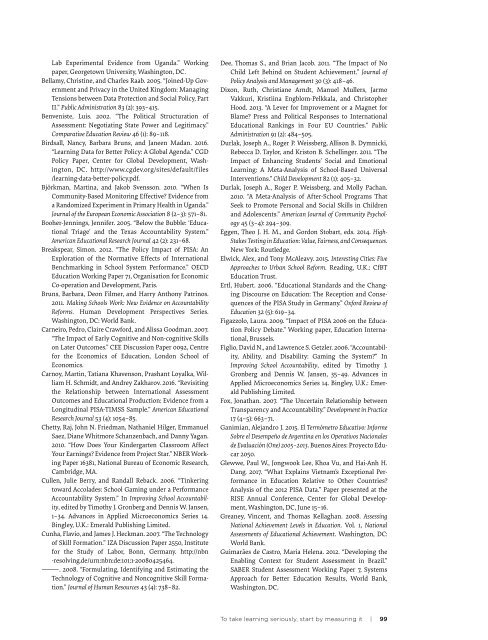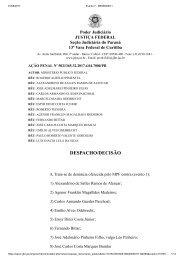Brasil só deve dominar Leitura em 260 anos, aponta estudo do Banco Mundial Relatorio Banco Mundial _Learning
You also want an ePaper? Increase the reach of your titles
YUMPU automatically turns print PDFs into web optimized ePapers that Google loves.
Lab Experimental Evidence from Uganda.” Working<br />
paper, Georgetown University, Washington, DC.<br />
Bellamy, Christine, and Charles Raab. 2005. “Joined-Up Government<br />
and Privacy in the United King<strong>do</strong>m: Managing<br />
Tensions between Data Protection and Social Policy, Part<br />
II.” Public Administration 83 (2): 393–415.<br />
Benveniste, Luis. 2002. “The Political Structuration of<br />
Assessment: Negotiating State Power and Legitimacy.”<br />
Comparative Education Review 46 (1): 89–118.<br />
Birdsall, Nancy, Barbara Bruns, and Janeen Madan. 2016.<br />
“<strong>Learning</strong> Data for Better Policy: A Global Agenda.” CGD<br />
Policy Paper, Center for Global Development, Washington,<br />
DC. http://www.cgdev.org/sites/default/files<br />
/learning-data-better-policy.pdf.<br />
Björkman, Martina, and Jakob Svensson. 2010. “When Is<br />
Community-Based Monitoring Effective? Evidence from<br />
a Ran<strong>do</strong>mized Experiment in Primary Health in Uganda.”<br />
Journal of the European Economic Association 8 (2–3): 571–81.<br />
Booher-Jennings, Jennifer. 2005. “Below the Bubble: ‘Educational<br />
Triage’ and the Texas Accountability Syst<strong>em</strong>.”<br />
American Educational Research Journal 42 (2): 231–68.<br />
Breakspear, Simon. 2012. “The Policy Impact of PISA: An<br />
Exploration of the Normative Effects of International<br />
Benchmarking in School Syst<strong>em</strong> Performance.” OECD<br />
Education Working Paper 71, Organisation for Economic<br />
Co-operation and Development, Paris.<br />
Bruns, Barbara, Deon Filmer, and Harry Anthony Patrinos.<br />
2011. Making Schools Work: New Evidence on Accountability<br />
Reforms. Human Development Perspectives Series.<br />
Washington, DC: World Bank.<br />
Carneiro, Pedro, Claire Crawford, and Alissa Goodman. 2007.<br />
“The Impact of Early Cognitive and Non-cognitive Skills<br />
on Later Outcomes.” CEE Discussion Paper 0092, Centre<br />
for the Economics of Education, Lon<strong>do</strong>n School of<br />
Economics.<br />
Carnoy, Martin, Tatiana Khavenson, Prashant Loyalka, William<br />
H. Schmidt, and Andrey Zakharov. 2016. “Revisiting<br />
the Relationship between International Assessment<br />
Outcomes and Educational Production: Evidence from a<br />
Longitudinal PISA-TIMSS Sample.” American Educational<br />
Research Journal 53 (4): 1054–85.<br />
Chetty, Raj, John N. Friedman, Nathaniel Hilger, Emmanuel<br />
Saez, Diane Whitmore Schanzenbach, and Danny Yagan.<br />
2010. “How Does Your Kindergarten Classroom Affect<br />
Your Earnings? Evidence from Project Star.” NBER Working<br />
Paper 16381, National Bureau of Economic Research,<br />
Cambridge, MA.<br />
Cullen, Julie Berry, and Randall Reback. 2006. “Tinkering<br />
toward Accolades: School Gaming under a Performance<br />
Accountability Syst<strong>em</strong>.” In Improving School Accountability,<br />
edited by Timothy J. Gronberg and Dennis W. Jansen,<br />
1–34. Advances in Applied Microeconomics Series 14.<br />
Bingley, U.K.: Emerald Publishing Limited.<br />
Cunha, Flavio, and James J. Heckman. 2007. “The Technology<br />
of Skill Formation.” IZA Discussion Paper 2550, Institute<br />
for the Study of Labor, Bonn, Germany. http://nbn<br />
-resolving.de/urn:nbn:de:101:1-20080425464.<br />
————. 2008. “Formulating, Identifying and Estimating the<br />
Technology of Cognitive and Noncognitive Skill Formation.”<br />
Journal of Human Resources 43 (4): 738–82.<br />
Dee, Thomas S., and Brian Jacob. 2011. “The Impact of No<br />
Child Left Behind on Student Achiev<strong>em</strong>ent.” Journal of<br />
Policy Analysis and Manag<strong>em</strong>ent 30 (3): 418–46.<br />
Dixon, Ruth, Christiane Arndt, Manuel Mullers, Jarmo<br />
Vakkuri, Kristiina Engblom-Pelkkala, and Christopher<br />
Hood. 2013. “A Lever for Improv<strong>em</strong>ent or a Magnet for<br />
Blame? Press and Political Responses to International<br />
Educational Rankings in Four EU Countries.” Public<br />
Administration 91 (2): 484–505.<br />
Durlak, Joseph A., Roger P. Weissberg, Allison B. Dymnicki,<br />
Rebecca D. Taylor, and Kriston B. Schellinger. 2011. “The<br />
Impact of Enhancing Students’ Social and Emotional<br />
<strong>Learning</strong>: A Meta-Analysis of School-Based Universal<br />
Interventions.” Child Development 82 (1): 405–32.<br />
Durlak, Joseph A., Roger P. Weissberg, and Molly Pachan.<br />
2010. “A Meta-Analysis of After-School Programs That<br />
Seek to Promote Personal and Social Skills in Children<br />
and A<strong>do</strong>lescents.” American Journal of Community Psychology<br />
45 (3–4): 294–309.<br />
Eggen, Theo J. H. M., and Gor<strong>do</strong>n Stobart, eds. 2014. High-<br />
Stakes Testing in Education: Value, Fairness, and Consequences.<br />
New York: Routledge.<br />
Elwick, Alex, and Tony McAleavy. 2015. Interesting Cities: Five<br />
Approaches to Urban School Reform. Reading, U.K.: CfBT<br />
Education Trust.<br />
Ertl, Hubert. 2006. “Educational Standards and the Changing<br />
Discourse on Education: The Reception and Consequences<br />
of the PISA Study in Germany.” Oxford Review of<br />
Education 32 (5): 619–34.<br />
Figazzolo, Laura. 2009. “Impact of PISA 2006 on the Education<br />
Policy Debate.” Working paper, Education International,<br />
Brussels.<br />
Figlio, David N., and Lawrence S. Getzler. 2006. “Accountability,<br />
Ability, and Disability: Gaming the Syst<strong>em</strong>?” In<br />
Improving School Accountability, edited by Timothy J.<br />
Gronberg and Dennis W. Jansen, 35–49. Advances in<br />
Applied Microeconomics Series 14. Bingley, U.K.: Emerald<br />
Publishing Limited.<br />
Fox, Jonathan. 2007. “The Uncertain Relationship between<br />
Transparency and Accountability.” Development in Practice<br />
17 (4–5): 663–71.<br />
Ganimian, Alejandro J. 2015. El Termómetro Educativo: Informe<br />
Sobre el Des<strong>em</strong>peño de Argentina en los Operativos Nacionales<br />
de Evaluación (One) 2005–2013. Buenos Aires: Proyecto Educar<br />
2050.<br />
Glewwe, Paul W., Jongwook Lee, Khoa Vu, and Hai-Anh H.<br />
Dang. 2017. “What Explains Vietnam’s Exceptional Performance<br />
in Education Relative to Other Countries?<br />
Analysis of the 2012 PISA Data.” Paper presented at the<br />
RISE Annual Conference, Center for Global Development,<br />
Washington, DC, June 15–16.<br />
Greaney, Vincent, and Thomas Kellaghan. 2008. Assessing<br />
National Achiev<strong>em</strong>ent Levels in Education. Vol. 1, National<br />
Assessments of Educational Achiev<strong>em</strong>ent. Washington, DC:<br />
World Bank.<br />
Guimarães de Castro, Maria Helena. 2012. “Developing the<br />
Enabling Context for Student Assessment in Brazil.”<br />
SABER Student Assessment Working Paper 7, Syst<strong>em</strong>s<br />
Approach for Better Education Results, World Bank,<br />
Washington, DC.<br />
To take learning seriously, start by measuring it | 99








